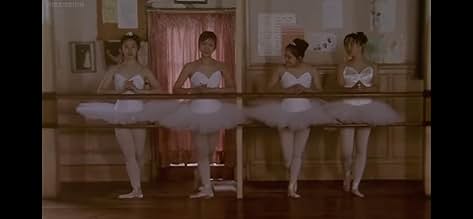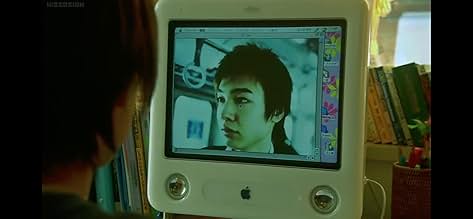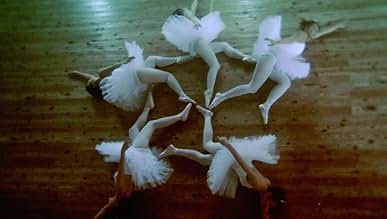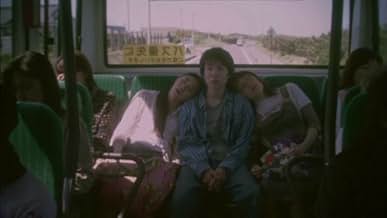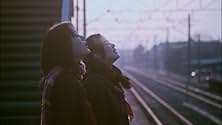Hana to Arisu
- 2004
- 2h 15min
CALIFICACIÓN DE IMDb
7.2/10
5.1 k
TU CALIFICACIÓN
Cuando dos mejores amigas se enamoran del mismo chico, desarrollan un plan para engañarlo y que salga con ellas.Cuando dos mejores amigas se enamoran del mismo chico, desarrollan un plan para engañarlo y que salga con ellas.Cuando dos mejores amigas se enamoran del mismo chico, desarrollan un plan para engañarlo y que salga con ellas.
- Dirección
- Guionista
- Elenco
- Premios
- 1 premio ganado en total
- Dirección
- Guionista
- Todo el elenco y el equipo
- Producción, taquilla y más en IMDbPro
Argumento
¿Sabías que…?
- TriviaAlthough released almost 11 years before Hana to Arisu satsujin jiken (2015), this movie actually serves as the sequel.
- Citas
Setsuko "Alice" Arisugawa: I saw 'Hannibal' on satellite last night.
Hana: So did I.
Setsuko "Alice" Arisugawa: I was scared.
Hana: Isn't he creepy?
Setsuko "Alice" Arisugawa: Yeah. Don't you think real people are scarier... than zombies and ghosts?
- ConexionesFeatures Taiyô no ôji: Horusu no daibôken (1968)
Opinión destacada
Iwai's tale of friendship and love among 15-year-olds is a bitter-sweet affair, joyous and poignant in fragments. It is not a perfect film, but still imbued with enough of Iwai's visual flair and inventiveness to raise it above much of what Japan has offered up in the first decade of the 21st century.
Hana (Anne Suzuki) is inadvertently brought to Ma-kun by her best friend Alice (Yû Aoi). She utilizes an accident to convince clumsy Ma-kun (Tomohiro Kaku) that he has lost his memory and that she is the love of his life. The lie grows out of control, and sucks in the best friend. Alice, meanwhile, has her own troubles to contend with, namely an eccentric mother, disinterested father, and an acting/modeling opportunity that continually misfires.
Like Iwai's 'Love Letter', the essentials of the plot are intricately laid out, but ultimately matter less than the shot-by-shot, scene-by-scene poetry conjured up by camera, light and direction. There is one breathtaking shot in a classroom, when Astro Boy is revealed watching brazenly over a lover's tiff. The manga motif serves to underline the heightened emotions and extreme dramatics of the tale. Similar optical playfulness is employed when Hana watches Ma-kun on the train, seemingly in conversation with his girlfriend. That shot is matched later when we are optically fooled into thinking Ma-kun will kiss Alice. It is this continual ability to surprise and delight that means the 2-hour plus running time, while self-indulgent, manages not to feel too much of an imposition.
There are some wonderful set pieces to celebrate here. Alice's father making a complete mess of gifting his daughter a fountain pen is painful and hilarious. Ditto Hana's mother appearing in her undies before a shell-shocked Ma-kun. A klutzy classmate's photos of the girls in ballet tutus turn out to be magical. These scenes, stagy and contrived in the hands of a lesser mortal, are fluid, vivid and delightful when presented by Iwai.
It is testament to Iwai's genius that a host of A-listers line up for walk-on parts in this film. For example, Hirsohi Abe, used to playing leads, is practically an extra here when he shows up as the boyfriend of Alice's mum. What other living director elicits such reverence? Hana and Alice glows, quite literally. The film captures that vividness of passionate friendships and love first encountered that only the qualia of a 15-year-old knows. Ultimately, the running time is a shade too flabby to count it among Iwai's masterpieces (the plural is deliberate), but this is a subtle, complex film worthy of repeat viewing.
Hana (Anne Suzuki) is inadvertently brought to Ma-kun by her best friend Alice (Yû Aoi). She utilizes an accident to convince clumsy Ma-kun (Tomohiro Kaku) that he has lost his memory and that she is the love of his life. The lie grows out of control, and sucks in the best friend. Alice, meanwhile, has her own troubles to contend with, namely an eccentric mother, disinterested father, and an acting/modeling opportunity that continually misfires.
Like Iwai's 'Love Letter', the essentials of the plot are intricately laid out, but ultimately matter less than the shot-by-shot, scene-by-scene poetry conjured up by camera, light and direction. There is one breathtaking shot in a classroom, when Astro Boy is revealed watching brazenly over a lover's tiff. The manga motif serves to underline the heightened emotions and extreme dramatics of the tale. Similar optical playfulness is employed when Hana watches Ma-kun on the train, seemingly in conversation with his girlfriend. That shot is matched later when we are optically fooled into thinking Ma-kun will kiss Alice. It is this continual ability to surprise and delight that means the 2-hour plus running time, while self-indulgent, manages not to feel too much of an imposition.
There are some wonderful set pieces to celebrate here. Alice's father making a complete mess of gifting his daughter a fountain pen is painful and hilarious. Ditto Hana's mother appearing in her undies before a shell-shocked Ma-kun. A klutzy classmate's photos of the girls in ballet tutus turn out to be magical. These scenes, stagy and contrived in the hands of a lesser mortal, are fluid, vivid and delightful when presented by Iwai.
It is testament to Iwai's genius that a host of A-listers line up for walk-on parts in this film. For example, Hirsohi Abe, used to playing leads, is practically an extra here when he shows up as the boyfriend of Alice's mum. What other living director elicits such reverence? Hana and Alice glows, quite literally. The film captures that vividness of passionate friendships and love first encountered that only the qualia of a 15-year-old knows. Ultimately, the running time is a shade too flabby to count it among Iwai's masterpieces (the plural is deliberate), but this is a subtle, complex film worthy of repeat viewing.
- LunarPoise
- 21 nov 2010
- Enlace permanente
Selecciones populares
Inicia sesión para calificar y agrega a la lista de videos para obtener recomendaciones personalizadas
- How long is Hana and Alice?Con tecnología de Alexa
Detalles
Taquilla
- Total a nivel mundial
- USD 654,448
Contribuir a esta página
Sugiere una edición o agrega el contenido que falta

Principales brechas de datos
What is the Spanish language plot outline for Hana to Arisu (2004)?
Responda
